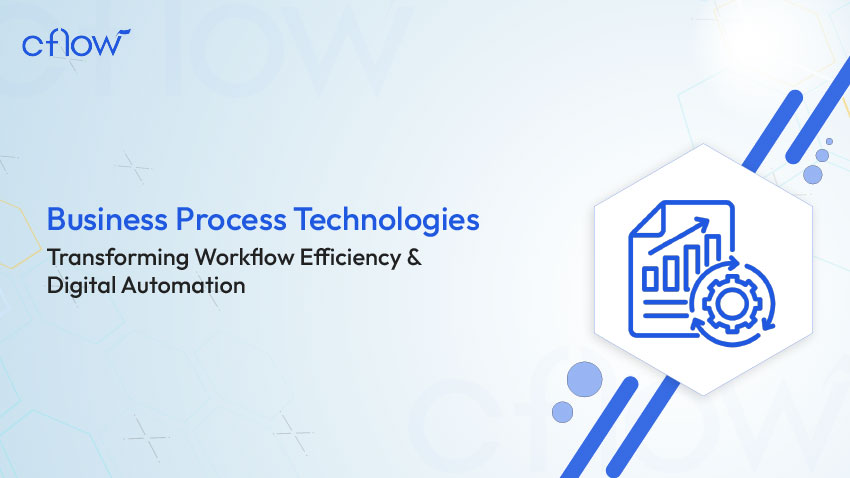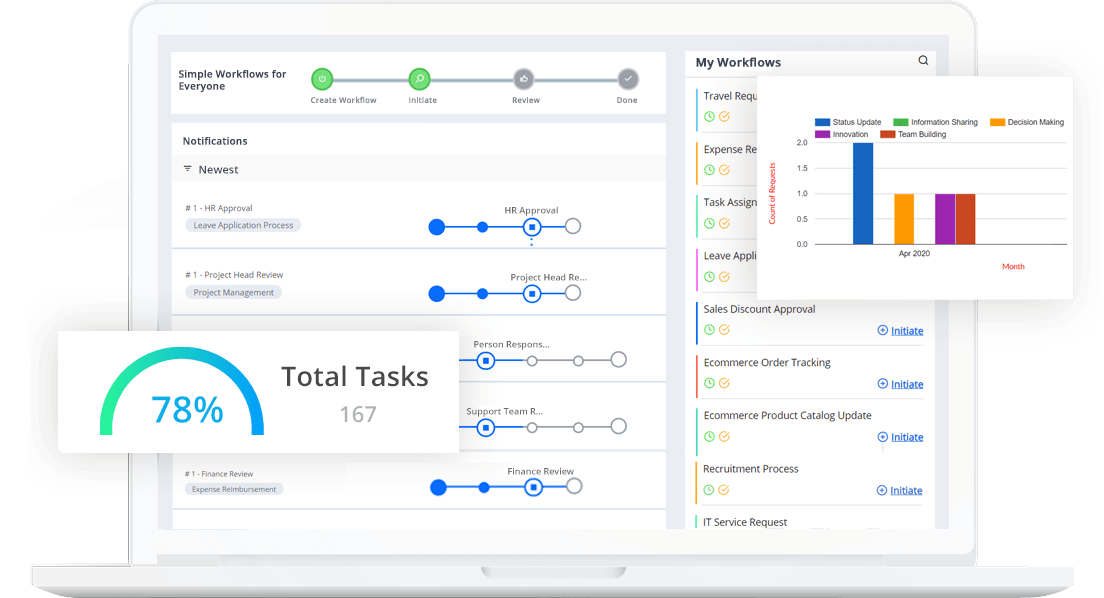Business Process Technologies: Transforming Workflow Efficiency and Digital Automation

Key takeaways
- Business process technologies streamline workflows, automate tasks, and improve overall efficiency for modern enterprises.
- The right business process automation technologies eliminate bottlenecks and enhance decision-making.
- Implementing business process management technology ensures seamless integration across multiple business functions.
- Business process automation technology enhances productivity, customer experience, and operational agility.
Businesses must constantly innovate to maintain efficiency and competitiveness. Business process technologies have emerged as essential tools for optimizing workflows, improving collaboration, and automating key tasks. Organizations that integrate business process automation technologies experience increased efficiency, reduced operational costs, and enhanced customer service.
With advancements in business process management technology, businesses can analyze, monitor, and refine workflows for maximum productivity. From business process automation technology to real-time monitoring solutions, companies are leveraging digital tools to streamline operations and drive growth.
This blog explores the core functionalities, types, benefits, and examples of business process technologies, helping businesses identify the best solutions for their digital transformation journey.
Table of Contents
What is Business Process Technology?
Business process technology refers to digital tools and solutions that help organizations design, execute, and manage business workflows more efficiently. These technologies automate repetitive tasks, improve collaboration, and optimize decision-making processes.
BPT is integral to business process automation technology as it helps organizations achieve faster execution times, reduce errors, and increase scalability. Whether managing supply chains, HR processes, or financial workflows, business process information technology enhances operational efficiency and enables seamless integration across different departments.
With the rise of business process management technology, companies are moving towards automation-first strategies, where AI-powered tools and data analytics drive digital workflows. This shift enhances productivity and ensures compliance, transparency, and agility in business operations.
Core Functionalities of BPM Technology
Business process management (BPM) technology plays a crucial role in streamlining operations, improving efficiency, and ensuring seamless workflow automation. From process modeling to enterprise application integration, BPM technologies provide businesses with the tools needed to digitally transform workflows, optimize decision-making, and drive productivity. Below are the core functionalities of BPM technology.
1. Process Modeling
Process modeling allows businesses to map out their workflows visually, providing a clear structure of how tasks and processes are interconnected. By using business process modeling tools, organizations can identify inefficiencies, streamline tasks, and enhance collaboration across departments. Process modeling helps businesses optimize workflows, reduce redundancies, and implement automation effectively.
2. Application Development
Many BPM technologies now include low-code or no-code development platforms that allow businesses to build custom applications without requiring extensive coding knowledge. This means that non-technical teams can develop and modify applications based on specific business needs. By integrating application development into BPM tools, companies can enhance flexibility, accelerate digital transformation, and improve user adoption.
3. Performance Monitoring
Monitoring and analyzing workflow performance is essential for business process optimization. BPM technology provides performance monitoring dashboards that offer data-driven insights, track key performance indicators (KPIs), and highlight bottlenecks that may hinder operational efficiency. With real-time tracking and analytics, businesses can measure success, allocate resources efficiently, and ensure that processes align with strategic goals.
4. Enterprise Application Integration
A well-functioning BPM system must integrate seamlessly with other business applications such as Customer Relationship Management (CRM), Enterprise Resource Planning (ERP), and Human Resource Management Systems (HRMS). Enterprise application integration (EAI) ensures that critical business functions remain interconnected, eliminating silos and promoting a unified workflow.
Importance of Business Process Technology
Business process automation technologies have become essential for organizations looking to enhance efficiency, reduce costs, and maintain a competitive edge. By leveraging business process management technology, companies can automate workflows, improve collaboration, and ensure compliance with industry regulations. Here’s why business process technology (BPT) is critical for modern businesses –
1. Optimized Workflows
BPT streamlines business operations automation, eliminating inefficiencies and ensuring that processes run smoothly. By automating workflows, businesses reduce human errors and create seamless operational execution across departments.
2. Improved Decision-Making
With real-time data analytics and performance monitoring, organizations can make informed, strategic decisions. BPM technologies provide actionable insights that improve forecasting, risk assessment, and overall business strategy.
3. Increased Productivity
By automating repetitive tasks, employees can shift their focus to high-value activities that drive business growth. This leads to greater employee satisfaction and optimized resource allocation.
4. Better Compliance and Security
Business process automation technology ensures regulatory compliance by maintaining accurate records, streamlining approvals, and reducing risks associated with manual errors. Companies can enhance data security and enforce standardized protocols for sensitive operations.
5. Scalability
BPT enables businesses to scale operations without inefficiencies. Automated processes allow organizations to expand seamlessly, supporting new business models and increasing operational agility.
Types of Business Process Technology
Modern businesses rely on business process automation technology to streamline operations, reduce manual effort, and enhance efficiency. Different types of business process management technology cater to various operational needs, ensuring smoother workflows and improved decision-making. Below are the key business process technologies that organizations leverage to improve performance.
1. Business Process Management (BPM)
BPM is a comprehensive approach that enables organizations to design, execute, monitor, and optimize business workflows. It acts as a centralized framework to streamline operations across departments, ensuring efficiency, visibility, and accountability. By integrating business process automation technologies, BPM allows companies to automate manual processes, improve collaboration, and align tasks with strategic goals.
- Business Process Monitoring
Business process monitoring involves real-time tracking and analysis of ongoing workflows to ensure operational efficiency. By utilizing performance monitoring tools, companies gain valuable insights into bottlenecks, inefficiencies, and deviations from expected performance benchmarks. Monitoring enables proactive issue resolution and helps businesses maintain compliance with industry regulations. For example, financial institutions leverage process monitoring to track transaction anomalies and prevent fraud.
3. Business Process Optimization (BPO)
BPO focuses on analyzing existing workflows and refining them for greater efficiency, reduced costs, and improved service quality. Organizations use data-driven insights and automation to eliminate redundancies, reduce processing times, and enhance resource allocation. Continuous improvement through BPO ensures that businesses remain competitive by adapting to market trends and evolving consumer demands. A well-optimized process can lead to organizations seeing a 25-30% reduction in operational costs.
- Business Process Modeling or Mapping
This technique involves visually representing business workflows to provide clarity and structure. Business process mapping tools help companies identify process inefficiencies, workflow gaps, and areas for automation. By documenting and analyzing business processes, organizations can implement data-driven changes, enhancing workflow effectiveness. BPM modeling plays a critical role in mergers and acquisitions, compliance audits, and digital transformation strategies.
5. Business Process Integration
Business process integration connects various enterprise systems, applications, and data sources to ensure seamless information flow and operational alignment. This includes integrating ERP, CRM, HRMS, and finance systems for a unified operational framework. By synchronizing these systems, businesses enhance cross-departmental communication, improve data accuracy, and streamline operations without redundancy.
6. Business Process Automation (BPA)
BPA leverages AI, robotic process automation (RPA), and machine learning to automate repetitive, manual tasks that consume time and resources. By eliminating human intervention in rule-based processes, companies achieve greater accuracy, faster execution, and increased efficiency. Some studies suggest that implementing automated bots in a contact center can reduce operational costs by 40%.
Benefits of Business Process Technology
The adoption of business process automation technology allows organizations to improve efficiency, reduce costs, and increase operational transparency. Companies that implement business process management technology gain a competitive advantage by eliminating inefficiencies, improving collaboration, and optimizing workflows. Here are the key benefits of leveraging business process automation technologies –
1. Eliminate Bottlenecks
Operational bottlenecks slow down processes, causing delays, increased costs, and inefficiencies. BPT ensures that workflows remain smooth and uninterrupted by identifying bottlenecks and resolving them through automation, process restructuring, and resource reallocation.
- Automation of Repetitive Tasks
Manual and repetitive tasks consume valuable employee time and are prone to human error. Business process automation technology removes these inefficiencies by automating rule-based processes such as invoice approvals, data entry, customer support requests, and inventory updates. This improves accuracy and allows employees to focus on strategic initiatives that drive growth.
- Decreased Operational Costs
Process automation reduces labor costs, resource wastage, and redundant manual efforts. By digitizing workflows, businesses can cut administrative overheads, optimize budget allocation, and enhance overall financial performance.
- Improved Transparency and Collaboration
Business process automation technologies enhance team collaboration by providing a centralized platform for real-time tracking, task management, and document sharing. This ensures that stakeholders have complete visibility into business processes, making workflows more transparent and manageable. Collaboration tools integrated into BPM allow teams to communicate seamlessly, resulting in faster decision-making and project execution.
5. Enhanced Agility
With markets evolving rapidly, businesses must stay agile to maintain a competitive edge. BPM technology enables organizations to adapt quickly by modifying processes in response to industry shifts, regulatory changes, or customer demands. Companies that leverage automation can introduce new workflows and pivot strategies more effectively, ensuring resilience in a dynamic business landscape.
6. Improved Productivity
By eliminating manual dependencies and introducing AI-driven workflow automation, organizations can significantly boost productivity. Employees can spend more time on high-value activities, while AI-powered analytics and automation take over repetitive tasks. BPM tools successfully automate tasks, particularly reducing manual errors by 48%, and increasing task completion speed by 42%.
7. Accelerates Growth
Scalable business process automation technology allows businesses to expand operations seamlessly without worrying about operational inefficiencies. BPM solutions help manage increased workloads, customer interactions, and growing data volumes effectively. This enables companies to scale operations while maintaining service quality and efficiency.
8. Improves Customer Service and Product Delivery
Customer satisfaction depends on fast, accurate, and responsive service delivery. BPM tools automate customer-related workflows such as order tracking, ticket resolution, and personalized engagement, ensuring a superior customer experience.
- Enhances Operational Efficiency
Business operations automation improves overall business efficiency by optimizing resource utilization, eliminating redundancies, and ensuring accurate data flow across departments. Organizations can analyze performance metrics, identify areas of improvement, and make data-driven decisions to enhance operational outcomes.
10. Streamlines Workflows
With automated workflows, organizations eliminate complex manual processes, reduce approval turnaround times, and ensure that tasks move smoothly through various stages without disruptions. Streamlining workflows leads to faster project completion, increased accuracy, and enhanced collaboration across teams.
End-to-end workflow automation
Build fully-customizable, no code process workflows in a jiffy.
Examples of BPM Technology
Business Process Management (BPM) technology is essential for improving operational efficiency, optimizing workflows, and ensuring seamless business process automation. Organizations across various industries use BPM tools to enhance process visibility, automate tasks, and streamline operations. Below are some of the most widely used business process technologies that help organizations implement, manage, and optimize their workflows effectively.
1. Business Process Management (BPM) Software
BPM software automates, manages, and optimizes business workflows to improve efficiency, compliance, and decision-making. By providing a centralized platform for process automation, BPM software reduces manual effort, enhances collaboration, and enables businesses to monitor workflow performance.
- Business Rules Engine
A business rules engine (BRE) automates decision-making by applying predefined business rules and logic to workflows. This reduces the need for human intervention in repetitive decision-making processes, such as invoice approvals, loan processing, and compliance checks.
- Business Process Monitoring
Business process monitoring provides real-time tracking and analytics to measure workflow performance and efficiency. It enables organizations to identify bottlenecks, inefficiencies, and deviations from standard procedures. With advanced data visualization dashboards and AI-driven insights, businesses can optimize processes, predict future trends, and maintain regulatory compliance.
- Business Process Management Suite (BPMS)
A Business Process Management Suite (BPMS) is a comprehensive set of BPM tools that work together to automate, monitor, and improve business processes. BPMS solutions include workflow automation, AI-powered analytics, document management, and process modeling functionalities.
- Business Process and Workflow Modelers
Workflow modeling tools enable businesses to map, visualize, and refine business processes for better efficiency. These tools help organizations identify redundancies, design optimized workflows, and document best practices. Business process modelers provide drag-and-drop functionality, making it easier for non-technical users to create and manage workflows.
Enhance Your Business with Cflow
Cflow is a no-code workflow automation platform that empowers businesses to streamline operations, enhance collaboration, and drive efficiency with intelligent automation solutions. Whether you want to automate business processes, improve operational visibility, or enhance team productivity, Cflow offers scalable and flexible solutions that cater to your needs.
How Cflow Supports Business Process Technologies –
- AI-Powered Automation – Cflow enables businesses to eliminate repetitive tasks and improve workflow efficiency through AI-driven automation.
- Seamless System Integration – Cflow integrates effortlessly with CRM, ERP, HRMS, and accounting systems, ensuring smooth data synchronization and operational consistency.
- Real-Time Monitoring & Analytics – With built-in dashboards and analytics tools, Cflow provides real-time insights into business processes.
- Custom Workflow Builder – Cflow’s no-code workflow automation tool allows businesses to design and modify workflows without requiring coding expertise.
- Scalable & Secure Solutions – Cflow provides enterprise-grade security and scalable automation solutions that grow alongside your business.
Final Thoughts
Business process technologies are shaping the future of work by enabling automation, improving collaboration, and enhancing decision-making. By adopting business process automation technologies, companies can eliminate inefficiencies, boost productivity, and drive sustainable growth. With Cflow, organizations can seamlessly integrate automation, optimize workflows, and improve business agility. Ready to enhance your operations?
Sign up for Cflow today and experience the power of workflow automation!
FAQs
- What is business process technology, and why is it important?
Business process technology refers to digital tools that automate, manage, and optimize workflows. It improves efficiency, reduces costs, and enhances collaboration, making business operations more scalable and streamlined.
- How does business process automation technology improve efficiency?
Automation eliminates repetitive tasks, reduces human errors, and speeds up workflows. It enhances productivity, ensures compliance, and allows teams to focus on strategic initiatives instead of manual work.
- How can businesses implement business process automation technologies effectively?
To implement automation successfully, businesses should assess their workflow needs, choose the right BPM tools, integrate automation strategically, and continuously monitor performance to optimize operations.
What should you do next?
Thanks for reading till the end. Here are 3 ways we can help you automate your business:

Do better workflow automation with Cflow
Create workflows with multiple steps, parallel reviewals. auto approvals, public forms, etc. to save time and cost.

Talk to a workflow expert
Get a 30-min. free consultation with our Workflow expert to optimize your daily tasks.

Get smarter with our workflow resources
Explore our workflow automation blogs, ebooks, and other resources to master workflow automation.
What would you like to do next?
Automate your workflows with our Cflow experts.



